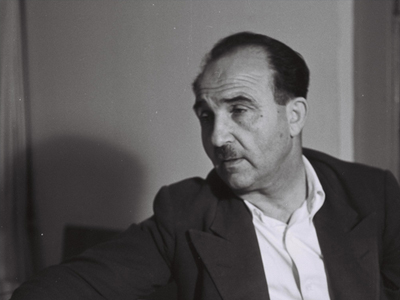Levi Eshkol Is Born in Ukraine

October 25, 1895
Levi Eshkol is born as Levi Shkolnik near Kyiv, Ukraine, into a Hasidic family. When he is denied admission into a local high school because of restrictions on Jewish students, he goes to Vilna, attends the Hebrew Gymnasium and becomes involved in Zionist youth groups.
In 1914, he makes aliyah at age 19. According to his daughter, he declines his parents offer of financial help, saying, “Only if I come empty-handed will these hands be ready to work.”
Levi lives and works in a variety of agricultural settlements. He is a pipe layer and a farm worker, picking olives and grapes. As a result of his work, he changes his last name to Eshkol, meaning “cluster of grapes.”
During World War I, he serves in the Jewish Legion and soon after is involved in developing and settling agricultural settlements throughout the Land of Israel. He becomes a leader in the Labor movement and the Mapai party, where he is involved in land purchases with JNF and oversees the creation of the National Water Company.
After the founding of the state, Eshkol serves as director-general of the Ministry of Defense, helping to unify the many defense organizations into the Israel Defense Forces. He also leads the Jewish Agency’s Settlement Division and serves as minister of agriculture and development in the 1950s. Tasked with absorbing thousands of immigrants during this time, Eshkol focuses on establishing settlements in border areas as a buffer against Arab infiltrations and as a way to ensure that the armistice lines became de facto borders.
In 1963 he becomes Israel’s third prime minister and its defense minister after nine years as finance minister. One of his first priorities upon assuming these two positions is to modernize the IDF by obtaining new weapons, especially aircraft, tanks and naval vessels. He develops a strong relationship with President Lyndon Johnson and arranges for advanced weapons purchases from America.
Using his organizational skills, Eshkol enhances Israel’s intelligence-gathering and reforms the army’s command structure, retaining and promoting some of Israel’s best generals, including Yitzhak Rabin, whom Eshkol appoints as IDF chief of staff in January 1964.
These strategies prove crucial in Israel’s victories in the Six-Day and Yom Kippur wars, allowing Israel to gain superiority in the air as well as being able to fight a multifront war.
Eshkol serves as prime minister until he dies in office in 1969.